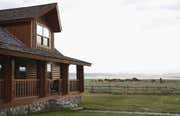The 2017 National Association of Realtors (NAR) Investment and Vacation Home Buyer’s Survey found that, in 2016, vacation home buyers had a median household income of $89,900 and bought properties a median distance of 200 miles from their primary residences. Those who bought property for investment purposes had a median income of $82,000 and purchased homes a median distance of 20 miles from their primary homes.
Not surprisingly, the top three locations for vacation property buyers were resort areas (25%), rural settings (25%) and small towns (21%). Investment property buyers leaned towards suburbs (34%), urban areas/city centers (23%) and small towns (18%). Regardless of income or location, people buy vacation properties for a variety of personal and financial reasons.
Vacation Property or Family Retreat
The largest group (42%) of vacation home buyers is interested in having the home primarily for vacations and family retreats. A vacation home can be particularly appealing if you like to visit the same location year after year. Owning a vacation property – rather than renting – provides many perks, such as:
- an opportunity to build equity, plus certain tax advantages (namely, the mortgage-interest deduction)
- the ability to customize (paint, decorate, renovate) the property based on your preferences
- the convenience of having your personal items in place, such as linens, toys and bicycles
- the comfort of knowing what to expect when you go on vacation
- the flexibility to use the property at any time
(For more, see: Tax Breaks for Second-Home Owners.)
Principal Residence in the Future
Some 18% of vacation home buyers plan to use the property as a primary residence in the future, according to the National Association of Realtors survey. If you vacation often in one area, for example, you may dream of living there during retirement – and taking advantage of all the area has to offer on a full-time basis. While it’s impossible to predict future home values, this strategy may allow you to lock in, at current prices, a home to using during retirement later. As an added bonus: The home can provide years of vacation enjoyment for you and your family before you reach retirement age. (See also: Strategies to Buy the Perfect Vacation Home.)
For a Family Member, Friend or Relative
It’s not uncommon for people to buy second homes for children, aging parents, relatives and friends to use. Some buyers, for example, purchase a home for their child or children to live in while attending college. This provides the kids with a comfortable place to spend their college years (which makes mom and dad feel better), and a place for family and friends to stay when visiting.
When the kids graduate, the property can be sold (ideally, for a profit), used as a vacation home or turned into an income-producing rental. (For more, see: Buying a Second Home to Rent: Dos and Don’ts.)
To Rent to Others
A big motivator for some vacation home buyers is the opportunity to generate income and offset the costs of a purchase. The vacation property could be on a year-round rental program, or rented out seasonally, such as summers (for beachfront properties), winters (for ski towns) and the winter holiday season – while you use it the rest of the year.
The tax implications of using a second home as a rental property are complicated, so be sure to speak with a qualified tax accountant before making any decisions. (For related reading, see: Vacation Home or Income-Producing Investment?)
To Diversify Investments
Some vacation home buyers are interested in using the property solely as a means of diversifying their investments. While there was a time when real estate was considered a sure thing – or at least a relatively low-risk investment – modern real estate markets make no guarantees about the future values of properties. It’s important to thoroughly research relevant market and sales trends before making any decisions to buy an investment property. (See also: The Complete Guide to Becoming a Landlord.)
Vacation Property Walkthrough: Considerations When Choosing a Vacation Property
-
 Investing
InvestingStrategies To Buy The Perfect Vacation Home
Ask yourself these six questions to make the right decision about a vacation property. -
 Managing Wealth
Managing WealthEconomics of Owning a Vacation Home
Discover the financial factors behind owning a second home and how weighing your options can determine if a vacation home is right for you. -
 Taxes
TaxesTax Rules For Renting Out Your Vacation Home
Here's a rundown of the specific tax rules that apply to homeowners renting out a vacation property. -
 Taxes
TaxesTax Breaks for Second-Home Owners
Owning a second home is a great investment for a variety of reasons, but you need to know the tax implications of multi-home ownership. -
 Personal Finance
Personal FinanceEasy And Practical Ways To Save For A Vacation
These simple changes to your spending and saving habits can put your next vacation easily within reach. -
 Personal Finance
Personal FinanceThe Best Times To Take A Vacation
Money shouldn't be the only factor when planning your next trip. Here are other factors to use when determining the best time to travel.



